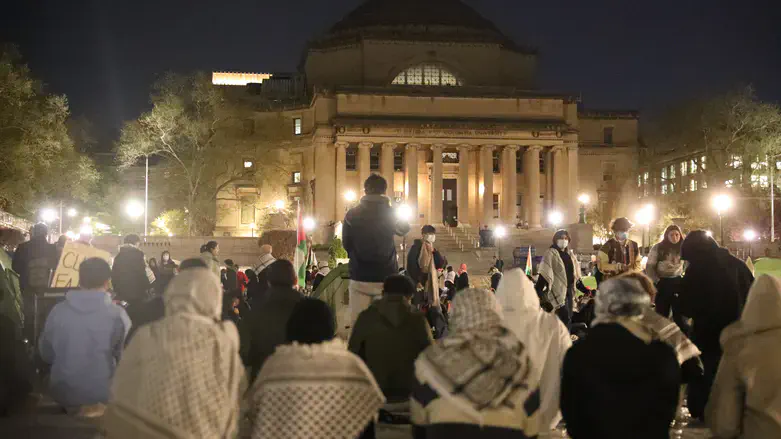
In light of the recent violent incident outside the Adas Torah synagogue on Pico Boulevard in Los Angeles, it is crucial to address the urgent need for law and order in handling such illegal and hate-fueled protests. This episode, where Hamas sympathizers clashed violently with Jews trying to attend their house of worship, underscores the growing trend of dangerous and unlawful protests. These hate inspired gatherings often are organized without permits and with blatant disregard for public safety, civil rights and order.
The Legal Framework
The United States has robust legal provisions to tackle hate crimes and illegal protests. Hate crimes are addressed under various federal and state laws, designed to impose severe penalties on those who commit crimes motivated by bias against race, religion, ethnicity, and other protected characteristics.
Under the federal Hate Crimes Prevention Act, individuals convicted of hate crimes can face up to 10 years in prison, or even life if the crime involves kidnapping, sexual assault, or murder.
California's Penal Code includes specific provisions to deal with hate crimes. Penal Code 422.55 PC defines a hate crime and mandates enhanced sentencing for those convicted of such offenses. Under Penal Code 422.7 PC, a misdemeanor can be elevated to a felony if it qualifies as a hate crime, resulting in harsher penalties.
The Importance of Identifying and Prosecuting Leaders and Funders
One of the most effective ways to deter future incidents is to identify, apprehend, and prosecute the leaders and funders of these illegal protests. These individuals not only orchestrate the logistics but also often incite violence and propagate hate. The law provides various avenues to hold them accountable:
1. Conspiracy and Incitement Charges: Organizers or leaders of violent protests can be charged with conspiracy under Penal Code 182 PC, which addresses conspiracies to commit any crime. Incitement to riot, under Penal Code 404.6 PC, carries penalties for individuals who urge others to engage in unlawful acts.
2. Illegal Assembly and Rioting: Protesting without a permit is a violation of local ordinances. When such assemblies turn violent, participants and organizers can face charges under Penal Code 409 PC (unlawful assembly) and Penal Code 404 PC (rioting).
3. Vandalism and Public Disorder: Acts of vandalism during protests fall under Penal Code 594 PC, which can lead to felony charges depending on the extent of the damage. Blocking traffic and disrupting public order can result in charges under various municipal codes and state laws designed to maintain public safety.
Targeting Organizations and Leaders
It's essential to investigate organizations like Students for Justice in Palestine (SJP), Within Our Lifetime (WOL), American Muslims for Palestine (AMP) and Al-Awda (The Palestine Right to Return Coalition), the Council on American-Islamic Relations (CAIR), and other groups that may harbor Hamas, Hezbollah, and other US deemed terrorist organization supporters. These organizations and several others should be scrutinized to determine if they have connections with designated domestic and foreign terrorist groups.
If such links are established, these entities and individuals can be prosecuted under anti-terrorism laws. By naming several organizations on terrorist lists, law enforcement can leverage additional legal tools to disrupt their activities and bring those responsible to justice.
Enforcement and Sentencing
To uphold law and order, law enforcement agencies must be proactive in preventing illegal protests and swiftly responding to any that occur. This involves:
• Preemptive Measures: Ensuring all protests have the necessary permits and planning adequate police presence to deter violence.
• Surveillance and Intelligence: identify and monitor potential protest leaders and funders.
• Prosecution and Sentencing: Prosecutors must pursue maximum sentences for those found guilty of hate crimes and other offenses related to illegal protests. This serves as a strong deterrent to others who might consider similar actions. It also means we need better district attorneys and attorney generals who are not using their office as a platform for political justice only.
We need to “follow the money” as far down the rabbit hole as we can go to make sure these rogue public servants are not doing the bidding of those looking to destroy the USA from within.
Addressing Anarchists and Lawlessness
Anarchists and other extremists often exploit the perceived lack of consequences in major cities to instigate and grow their movements. Without strict enforcement and clear penalties, these groups feel emboldened to disrupt public order and commit acts of violence. Strengthening legal consequences and ensuring swift action against illegal activities can curb their influence and prevent further escalation.
The Explosion of Anti-Semitism
The incident on Pico Boulevard is part of a worrying rise in anti-Semitic acts across America. According to the Anti-Defamation League (ADL), anti-Semitic incidents in the U.S. reached an all-time high in recent years. This surge highlights the urgent need for focused attention and action against anti-Semitism specifically, rather than diluting the response by also addressing other forms of bigotry like Islamophobia, which, while significant, does not match the current intensity and frequency of anti-Semitic incidents.
In the U.S., Jews make up about 2% of the population, yet they are disproportionately targeted in hate crimes. According to the FBI’s hate crime statistics, over 60% of religiously motivated hate crimes target Jews, despite their small population size. This stark contrast underscores the need for immediate and focused action to combat anti-Semitism.
Conclusion
The violent incident on Pico Boulevard, coupled with the precedent set by dropping charges of all Columbia University protesters, underscores the pressing need for a stringent approach to law and order. Identifying and prosecuting the leaders and funders of illegal protests to the fullest extent of the law is essential.
By leveraging existing legal frameworks and ensuring rigorous enforcement and sentencing, we can deter future incidents, uphold public safety, and maintain the integrity of our legal system.
Michal Sinensky is an American based entrepreneur and Co-Founder of Israel Friends